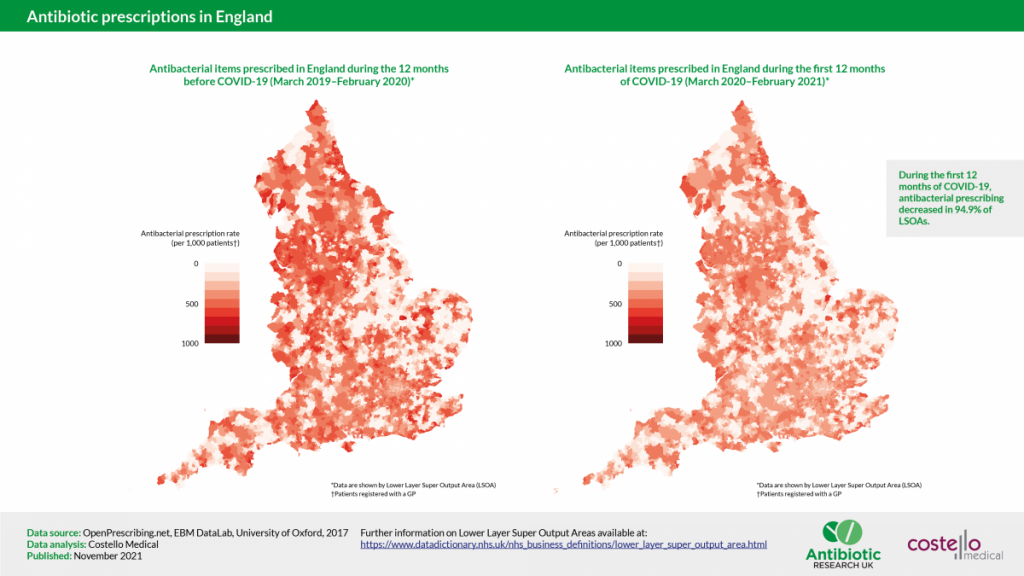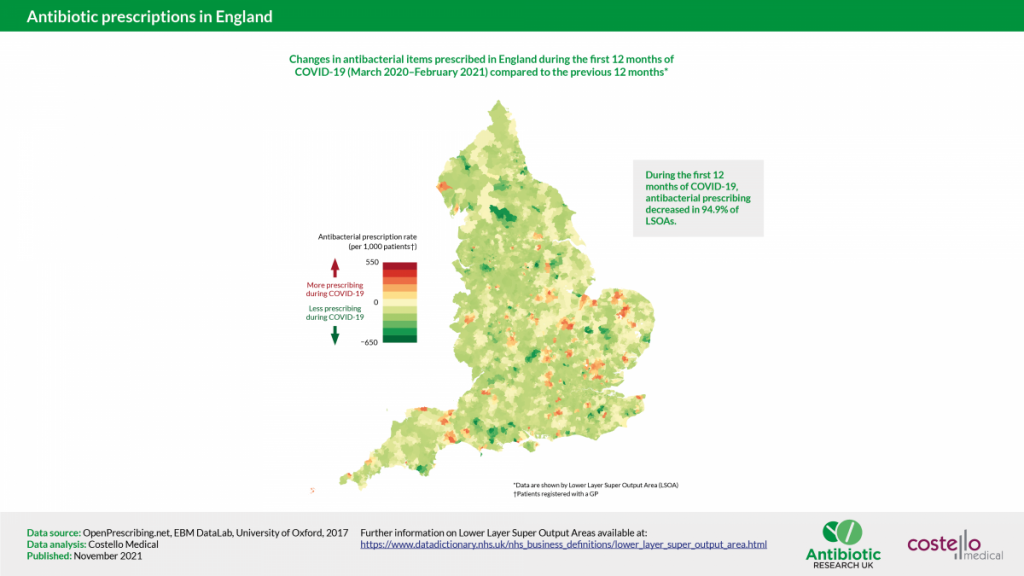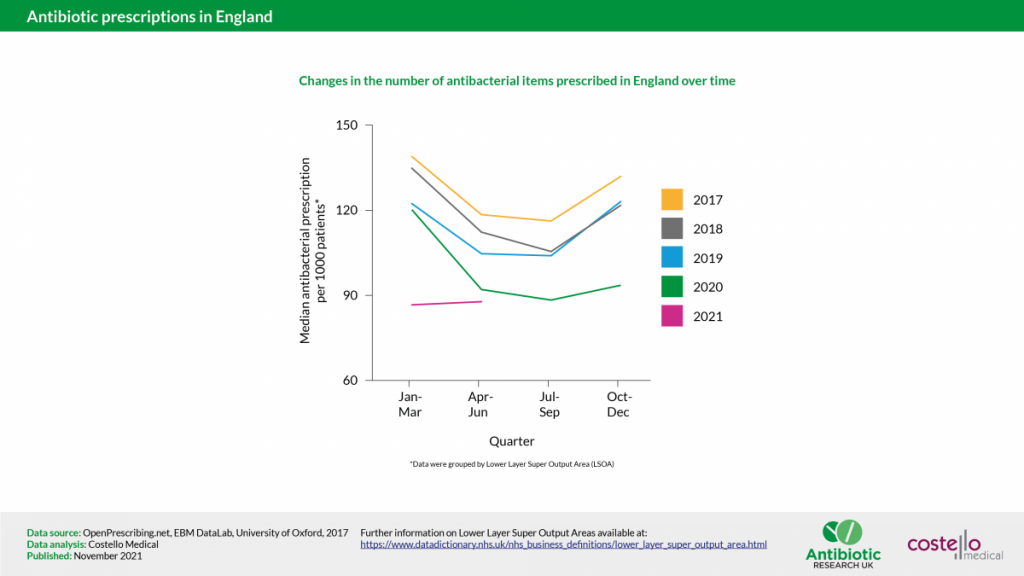Antibiotic prescribing by GPs in England fell by 17% during the first 12 months of Covid without the usual winter increase
New research by Antibiotic Research UK hints at scale of over-prescribing in normal times.
Antibiotic Research UK commissioned an analysis of new antibiotic prescription data ahead of World Antimicrobial Awareness Week (WAAW), 18–24 November, and European Antibiotic Awareness Day (EAAD), 18 November.
Key findings include:
- During the first 12 months of the COVID-19 pandemic (March 2020-February 2021), antibiotic prescribing in general practice in England fell by 17% compared to the previous 12 months
- The fall hints at the scale of over-prescribing in normal times which increases the risk of antibiotic resistance
- Prescribing remained steady throughout the year without the winter peak seen in normal years
- Data reveals geographical localities of greatest reduction as well as others where prescribing rose
York, UK, 11th November 2021 / Sciad Newswire / Antibiotic Research UK (ANTRUK) has released new research on antibiotic prescribing in England during the first 12 months of the pandemic. The research shows a 17% reduction in the prescribing of antibiotics in general practice compared to the previous year (pre-pandemic: March 2019 to February 2020; pandemic: March 2020 to February 2021).

ANTRUK, in collaboration with Costello Medical, analysed NHS data from OpenPrescribing.net grouped by areas with a mean population size of 1500 people (Lower Layer Super Output Areas (LSOA*)). By studying local data from the whole of England it was possible to establish a clear national picture of antibiotic prescribing in general practice before and during the pandemic, revealing areas showing the greatest falls in prescribing and, contrary to the national trend, areas where prescribing actually rose as well.

Professor Colin Garner, Chief Executive of Antibiotic Research UK, said: “The dramatic fall in antibiotic prescribing during the COVID pandemic could be due to many factors including less infection transmission during lockdowns and fewer visits to GPs. More work is needed to understand the extent to which each of these factors has resulted in this drop in antibiotic prescribing, but the data does tell us that antibiotic prescribing can be reduced to help protect us all from the danger of the growing threat of antibiotic resistance.”
Amy Buchanan-Hughes, Head of Real-World Evidence at Costello Medical, said: “We were pleased to see that almost all areas of the country were able to reduce antibiotic prescribing during the COVID pandemic. However, there was considerable variability across the country, and we did not find any clear reason for the differences. This suggests that there is still room for improvement in many regions.”
Analysis of the data also reveals that the rise in antibiotic prescribing that occurs each winter (December to February) compared to the previous summer (June to August) was considerably lower (4%) for the winter of 2020 to 2021 (pandemic) compared to the rise seen in the winter of 2019 to 2020 (21%, pre-pandemic).

Professor Colin Garner added: “Although typical cough symptoms can take up to three weeks to resolve, we also know that antibiotics for most respiratory tract infections (your typical cough, sore throat, earache) do not speed up recovery times. Instead, they often give patients many side-effects, and promote the development of resistant bacteria. This study therefore highlights the potential of sustaining lower antibiotic prescribing rates in general practice.”
ENDS
Notes to Editors
*LSOA: Lower Layer Super Output Areas are built from groups of contiguous Output Areas and have been automatically generated to be as consistent in population size as possible, and typically contain from four to six Output Areas. The Minimum population is 1000 and the mean is 1500. There is a Lower Layer Super Output Area for each POSTCODE in England.
**Data source: OpenPrescribing.net, EBM DataLab, University of Oxford
Data analysis: Costello Medical, Published: November 2021
About Antibiotic Research UK (ANTRUK)
The world’s first charity and only charity focused on tackling bacterial antibiotic resistance. The charity’s mission is to develop new antibiotic treatments, educate the public about resistance and provide patient support. Since its formation in 2014, the charity has funded research, supported academic groups in universities and employed the country’s first Patient Support Officer focussed on supporting patients with an antibiotic resistant infection. The charity relies wholly on public donations and receives no government support.
You can learn more about Antibiotic Research UK at www.antibioticresearch.org.uk
Costello Medical
Costello Medical provides scientific support to the healthcare industry in the analysis, interpretation and communication of clinical and health economic data. All research for ANTRUK was conducted on a pro bono basis.
For further information
Please contact Juliette Craggs or Richard Anderson
T: 020 3405 7892
E: media@antibioticresearch.org.uk
Learn more about Antibiotic Research UK (ANTRUK) at
Website: www.antibioticresearch.org.uk
Facebook: @AntibioticResearchUK
Twitter: @1Antruk
Got an innovation you need bringing to life?
We’d love to hear from you! Head to our contact page to start a conversation.
